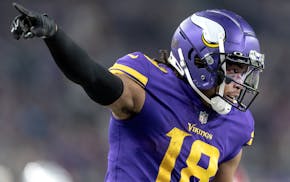It was third down from the Gophers 4-yard line, so a stop likely would have forced Michigan to kick a field goal Saturday. Wolverines tight end Devin Funchess cut toward the right corner, hoping to catch a fade pass. When the football came, however, cornerback Martez Shabazz put his arm over Funchess' shoulder and knocked the ball away.
The yellow flag hit the ground nearly simultaneously with the football. Pass interference. First down, Michigan. Shabazz threw his arms in the air in disbelief.
And his wasn't the only objection.
"I was probably just relieving some frustration," Gophers coach Jerry Kill said Tuesday of his volatile reaction. He shouted and gestured for more than a minute at the back judge, the side judge and the referee, and resumed the argument after Michigan scored a touchdown on the next play, giving the Wolverines a 14-7 lead in the final minute of the first half of an eventual 35-13 victory.
Frustration seems to be inherent in the game these days, and Kill was hardly the only coach to lose his cool over a pass-interference call Saturday. Nebraska's last-minute comeback at Michigan State on Saturday was aided by a pass-interference flag so controversial that even Spartans basketball coach Tom Izzo publicly criticized the officials a day later.
Kill's reaction would seem to make him Advocate No. 1 for changing the pass interference rule, and he will sit on the American Football Coaches Association rules committee next year, making recommendations to the NCAA. But even a 30-year coach admitted he doesn't have a good answer for the problem of inconsistent interpretation.
"The toughest thing is, it's a judgment call," Kill said. "In fairness to the officials, it's no different than officiating basketball, and when you get to the Final Four, all of a sudden, they really let you play [where as] early in the season, they call a touch foul. So I just think that's part of the game."
Kill is worried about adding more complexity, and more replays, to the game, because some college games already last more than 3 1/2 hours.
"So I think that's part of the game, and as a coach, you've got to coach within the rules and teach them the best you can," he said. "Sometimes those things work out in your favor. Sometimes they don't."
And when they don't, sometimes he goes ballistic. Kill was a little embarrassed about his reaction, but admitted he's occasionally too competitive to tamp down his emotions in the heat of a game.
"Probably I need to spend more time coaching than taking my frustrations out [about] the call, to be honest with you," he said. "Whether I was right or wrong, [I] probably needed to spend more time worrying about what I could control instead of what I couldn't. So I guess you can put that down as not good coaching on my part. I mean, it's not going to change the call. ... We all have gut reactions to situations, and it was just a reaction. But the officials handled it well, and I eventually handled it better. And got back to coaching."
Injury update The Gophers will prepare for Illinois this week with their leading receiver, A.J. Barker, watching from the sidelines.
"I really question whether he will play or not," Kill said. "That seems to be a little bit more of an issue than [the team's medical staff] thought at the beginning."
Barker sprained the back of his right ankle, near the Achilles' tendon, while catching a touchdown pass against Purdue on Oct. 27. He didn't practice until doing some light drills Thursday, and the Gophers decided before the Michigan game that Barker hadn't healed enough to play. Barker's 30 catches this season are twice as many as the team's second-leading receiver, Isaac Fruechte, and his seven touchdowns are five more than any other wide receiver.
"A.J. is the biggest concern," Kill said. "Unless some miracle takes place, I don't look for him to be able to play [against Illinois]."
Kill said another receiver, Derrick Engel, injured a hamstring against Michigan and is questionable. Engel, however, said the injury shouldn't be something that keeps him out of practice this week.
Left tackle Ed Olson, out for three weeks because of ankle injuries of his own, is expected to practice, Kill said, and he hopes the junior will be available at Illinois. Derrick Wells should also play, after sitting out several practices -- but no games -- because of a laceration on his leg.
Ex-minor league umpire sues MLB, says he was harassed by female ump, fired for being bisexual man

Reusse: There's no doubt Finch is the right coach for the Wolves
Nootbaar, Gibson spark Cardinals to 5-1 victory over Diamondbacks
